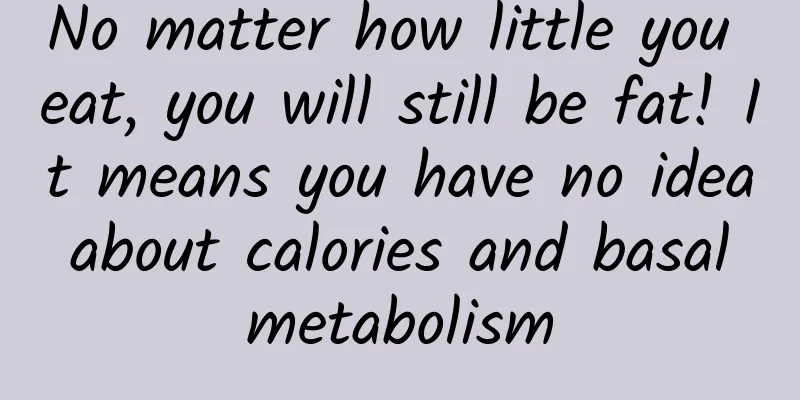No matter how little you eat, you will still be fat! It means you have no idea about calories and basal metabolism

|
I only eat apples and blanched vegetables for dinner, which are obviously very low in calories, but why can't I lose weight? Many people don't eat much, but they can't lose weight. In fact, losing weight does not mean starving yourself. Long-term nutritional imbalance will become the culprit for not being able to lose weight! First understand the concepts of calories and basal metabolism, so you can take care of your body without going hungry! If you want to lose weight, but you don’t know how many calories you consume in your daily life and what nutrients you take in every day, how can it be easy to lose weight successfully? Chinese medicine practitioner Tian Yimin reminds us that dietary calories and nutrition are the key to weight loss. Calorie control does not mean simply following a "low-calorie" diet. Instead, you should first understand your basal metabolism and then decide how much food you can eat in a day while taking nutrition into consideration. Understand your basal metabolism and eat the right amount of calories so you don't get fat What is basal metabolism? Even when the human body is at rest every day and not moving, it will still consume calories to maintain the basic functioning of the organs. This is called "basal metabolism." In other words, even if you are losing weight, you still have to consume the calories needed for basal metabolism every day to avoid harming your health, and you won't gain weight. For example, assuming a person's basal metabolic rate is 1500 calories, then the calories consumed in three meals a day must reach this number and cannot be less than 1500 calories. In addition, it is unlikely that most people will stay still all day long. They will have some extra activity, so there will be extra calories burned. If you consume 1,500 calories a day, you will not gain weight, so don't worry! After understanding your basal metabolism, you can eat according to your basic calorie needs and don't have to worry about gaining weight due to excessive calorie intake. Three meals with balanced nutrition to avoid body consumption and weight loss After knowing how many calories you can consume every day, you should not only pay attention to calories when eating, but also make sure that every meal contains nutrients such as carbohydrates, proteins, vitamins, minerals, dietary fiber, etc., rather than foods such as cakes, biscuits, and potato chips that are high in sugar, high in fat, and low in nutritional value. Chinese medicine practitioner Tian Yimin compared it to a car that needs a certain amount of gasoline to start. If the gasoline is insufficient for a long time, the car parts will easily be worn out and frequent maintenance will be required. The same goes for the human body. Long-term lack of calories and nutrition will also consume various organs and cause endocrine disorders. After a long time, you will not be able to lose weight no matter how much you eat! So, how do you calculate your basal metabolic rate for a day, and how do you know how many calories you should eat in a day? Dr. Tian Yimin pointed out that the basal metabolic rate (BMR) can be calculated using the following formula: BMR (male) = (13.7 × weight (kg)) + (5.0 × height (cm)) - (6.8 × age) + 66 BMR (female) = (9.6 × weight (kg)) + (1.8 × height (cm)) - (4.7 × age) + 655 For example, for a 30-year-old woman who weighs 50 kg and is 160 cm tall, her basal metabolic rate is (9.6x50)+(1.8x160)-(4.7x30)=1282 (kcal). That is to say, this woman needs to consume at least 1,300 calories a day. For example, a 50 kg office worker needs 1500 calories a day. If you want to lose weight healthily, you should consume slightly less than 1500 calories a day, but not less than your basal metabolic rate. However, as mentioned earlier, it is unlikely that most people will lie still all day long, and they usually have extra calorie consumption. Therefore, the following formula can be used to calculate the actual daily calorie requirement (based on activity level), which is usually a little more than the basal metabolism to maintain neither weight gain nor weight loss. Light work: weight (kg) x 30 Office workers who usually sit in the office, use computers, and answer the phone Moderate work: weight (kg) x 40 People who often walk around, run around, or do housework Heavy working weight (kg) x 45 Laborers who need to lift heavy objects Accurately calculate your weight loss needs to lose weight healthily and effectively In addition, a cumulative reduction of 7,700 calories can reduce 1 kilogram. For the 50 kg female office worker mentioned above, the calories she actually needs every day are 1500 kcal, and her basal metabolic rate is about 1300 kcal. Therefore, if she wants to lose weight, she can consume 1300 kcal every day, which is equivalent to eating 200 kcal less. After 38.5 days, she can lose 1 kilogram! Only by calculating smartly like this can you maintain basic health and actually lose weight. You can also set a clear weight loss plan and know exactly how many days it will take you to reach your ideal weight loss number. It is simple, clear and effective! However, while reducing dietary calories, don’t forget to take nutrition into consideration. The following foods are good choices: Sweet potatoes are rich in fiber and nutrients, and can moderately replace white rice to help lose weight. Low GI diet is good to choose these foods and supplement them "High fiber, low oil, low sugar" is the basic principle of diet. Chinese medicine physician Tian Yimin recommends choosing more low-GI foods that are rich in dietary fiber and have a strong sense of satiety, such as beans, green leafy vegetables, potatoes, etc. In addition, the following foods are rich in nutrients and high in dietary fiber, which can help you lose weight and add points to your health! 1. Sweet potatoes It is rich in dietary fiber, which helps with bowel movements and weight loss, but it has a high starch content. You can easily control calories by replacing the white rice in your main meal with sweet potatoes. 2. Oats It is rich in nutrients such as B vitamins, dietary fiber, minerals, etc. The insoluble fiber helps intestinal motility and smooth digestion, while the soluble fiber can lower cholesterol and stabilize blood sugar. 3. Job’s tears Rich in protein, vitamin B1, calcium, phosphorus, iron and other nutrients, "Compendium of Materia Medica" records that coix seed can strengthen the spleen and stomach, thus helping to improve edema-type obesity. 4. White Fungus Its low calorie content and rich dietary fiber make it a great tool for helping you lose weight. The special polysaccharides in white fungus can also enhance immunity, and the gelatin can maintain skin moisture. Moderate consumption is a good helper for skin care. |
<<: Is starch the killer of obesity? Doctor: Controlling body fat can prevent weight gain
>>: Are your muscles strong? Here are 5 kettlebell exercises to keep your body strong
Recommend
How long does it take to recover from a fungal infection?
Fungal infection is a fungal infection. It has a ...
What are the best ways to treat cervical hypertrophy?
I believe everyone should know the dangers of cer...
Potassium permanganate sitz bath helps treat vaginitis
Vaginitis is a common gynecological disease. Some...
What medicine can make uterine fluid disappear during pregnancy?
What medicine can make uterine effusion disappear...
How to prevent cervical hypertrophy
Cervical hypertrophy is a manifestation of cervic...
How long does it usually take to rest after a miscarriage?
The rest time after miscarriage varies according ...
Detailed introduction to several causes of menopause
If menopausal patients are not treated, they will...
How can women prevent amenorrhea?
Women will experience amenorrhea at a certain age...
Experts guide the correct use of drugs for hyperprolactinemia
The disease of hyperprolactinemia has existed in ...
Menstruation delayed for half a month
Menstruation delayed for half a month A delay of ...
Causes of bleeding in urine due to vaginitis
In cases where vaginitis may cause bleeding in ur...
Can I have an IUD if I have pelvic effusion?
IUD is a popular and effective contraceptive meth...
Do you feel like having diarrhea after drinking milk tea at the breakfast shop? Nutritionist reveals possible hidden reasons...
Have you ever experienced diarrhea after drinking...
What factors cause vulvar leukoplakia?
Medically, the whitening, roughening, and shrinki...
How to prevent recurrent cervicitis in women? Doing these things can effectively prevent cervicitis
Many women who have given birth will find that th...









